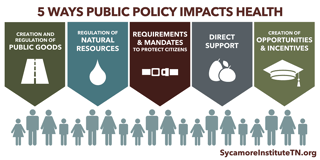
Public policy is an institutionalized proposal or a decided set of elements like laws, regulations, guidelines, and actions to solve or address relevant and real-world problems, guided by a conception and often implemented by programs. Public policy can be considered to be the sum of a government's direct and indirect activities and has been conceptualized in a variety of ways. They are created and/or enacted on behalf of the public typically by a government. Sometimes they are made by nonprofit organisations or are made in co-production with communities or citizens, which can include potential experts, scientists, engineers and stakeholders or scientific data, or sometimes use some of their results. They are typically made[how?] by policy-makers affiliated with (in democratic polities) currently elected politicians. Therefore, the "policy process is a complex political process in which there are many actors: elected politicians, political party leaders, pressure groups, civil servants, publicly employed professionals, judges, non-governmental organizations, international agencies, academic experts, journalists and even sometimes citizens who see themselves as the passive recipients of policy." A popular way of understanding and engaging in public policy is through a series of stages known as "the policy cycle", which was first discussed by the political scientist Harold Lasswell in his book ‘The Decision Process: Seven Categories of Functional Analysis’ published in 1956. The characterization of particular stages can vary, but a basic sequence is: agenda setting – policy formulation – legitimation – implementation – evaluation. "It divides the policy process into a series of stages, from a notional starting point at which policymakers begin to think about a policy problem to a notional end point at which a policy has been implemented and policymakers think about how successful it has been before deciding what to do next." Officials considered as policymakers bear responsibility to reflect the interests of a host of different stakeholders. Policy design entails conscious and deliberate effort to define policy aims and map them instrumentally. Academics and other experts in policy studies have developed a range of tools and approaches to help in this task. From Wikipedia